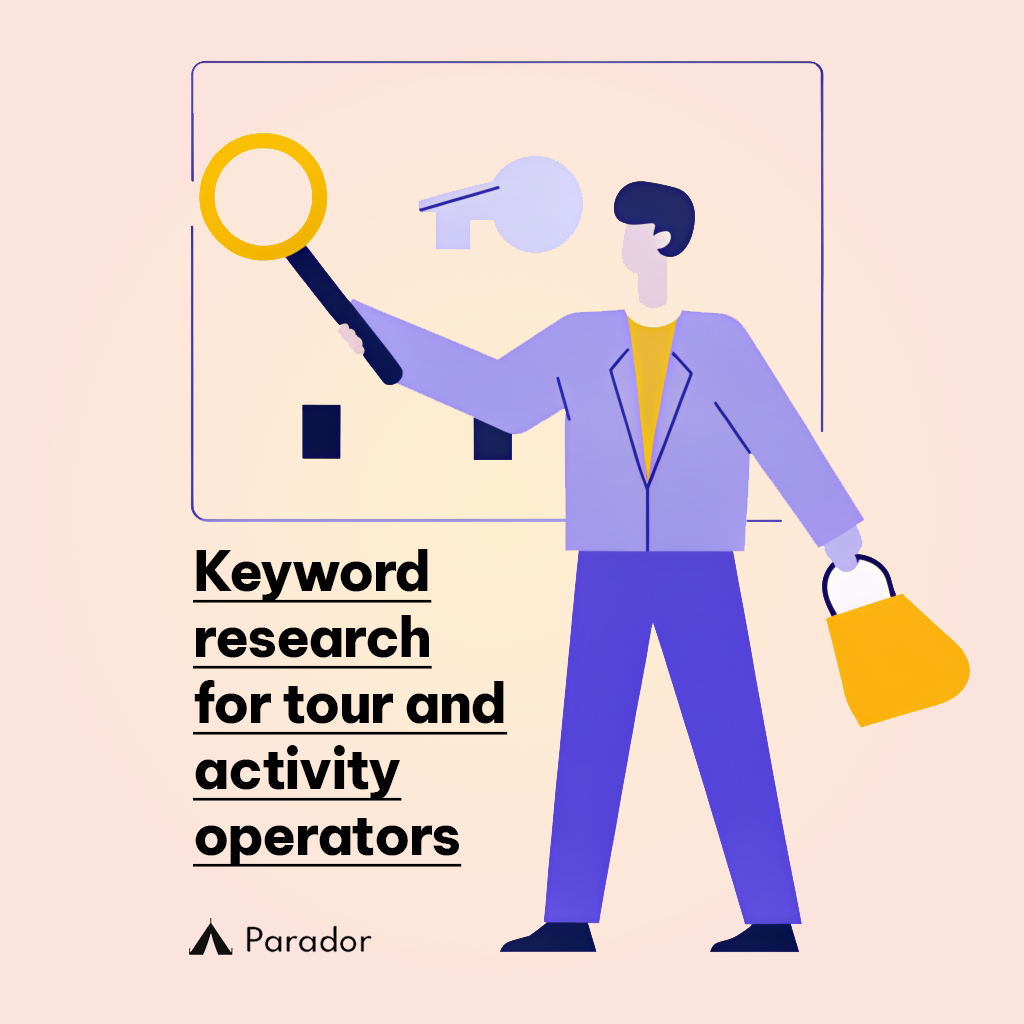
If you’re a tour operator looking to implement an effective SEO campaign for your site, you’ll be aware of the importance of finding the right keywords to target for your business.
However, keyword research can be complicated, and tour operators in particular face challenges in differentiating between the different types of keywords, and knowing how they should be implemented within a full SEO strategy.
In this guide, we’re going to demystify keyword research by explaining the different types of keywords that are relevant to tours and activities. We’ll also explain some of the best free and paid tools, and give actionable tips for finding the best tour keywords using those tools.
The importance of keyword research for tours
Keyword research is important because keywords are the basic building blocks of any tour SEO strategy.
Searchers who are looking for tours and activities in a given destination will usually type a keyword into a search engine such as Google in order to find the information they are looking for. The challenge as a tour operator is to make sure that you know which keywords your target audience are searching, and create dedicated pages on your website to match those keywords.
There is more to a keyword than the actual words a user types, though. Keywords have very specific intents, and in order to rank well, the pages you create to target your chosen keywords should take into account the nuances of the search intent.
Understanding search intent
For example, a searcher who types ‘private tours in atlanta city’ has a pretty clear intent: they want to find information about different private tours that are available in Atlanta City, and they are likely interested in booking one.
Since this keyword has a commercial intent, we can call it a bottom-of-the-funnel keyword, and it is best targeted with an optimized page describing your private tour offering.
However, a keyword like ‘best time of year to visit atlanta city’ has a different search intent behind it. The wording here implies that the searcher hasn’t yet committed to a trip, and is still looking for information in the ‘research’ stage.
This is hence a high-funnel (non-commercial) keyword, but it represents a good opportunity to drive searchers further down your marketing funnel via an SEO-optimised blog post that explains the weather and things to do at different times of the year, while highlighting your company’s offering.
If you’re unsure about the search intent for a specific keyword, look at the SERPs (search engine result pages) for that keyword. Does the keyword return mainly blog posts, or tour package pages? What information does top-ranking content include? Since search engines like Google use natural language processing to understand search intent, the top results are usually a good indication of what the search intent behind a specific keyword is.
In this way, you can see how content can be aligned with search intent to improve rankings, and how different keywords can be mapped to different stages of your travel marketing funnel, which will help you to prioritise the SEO resources you allocate to each of them.
Finally, you might find it helpful to map intents to keywords via a spreadsheet, which can look something like the following:

Keyword research starts with user personas
Any keyword research process worth its salt is backed up by strong user persona identification. This is the time to ask: who is your ideal client? What are their interests and demographics? Where do they come from?
The winning strategy for crafting an SEO campaign that addresses all touchpoint in the travel booking sales cycle is to find keywords that your target audience are searching during travel research, and user personas help you to do that.
The reason? Phocusright’s U.S Consumer Travel Report shows that 40% of travellers aged 18-54 (but primarily Gen-Z and Milllenialls) will book tours and activities before other aspects of their trip.
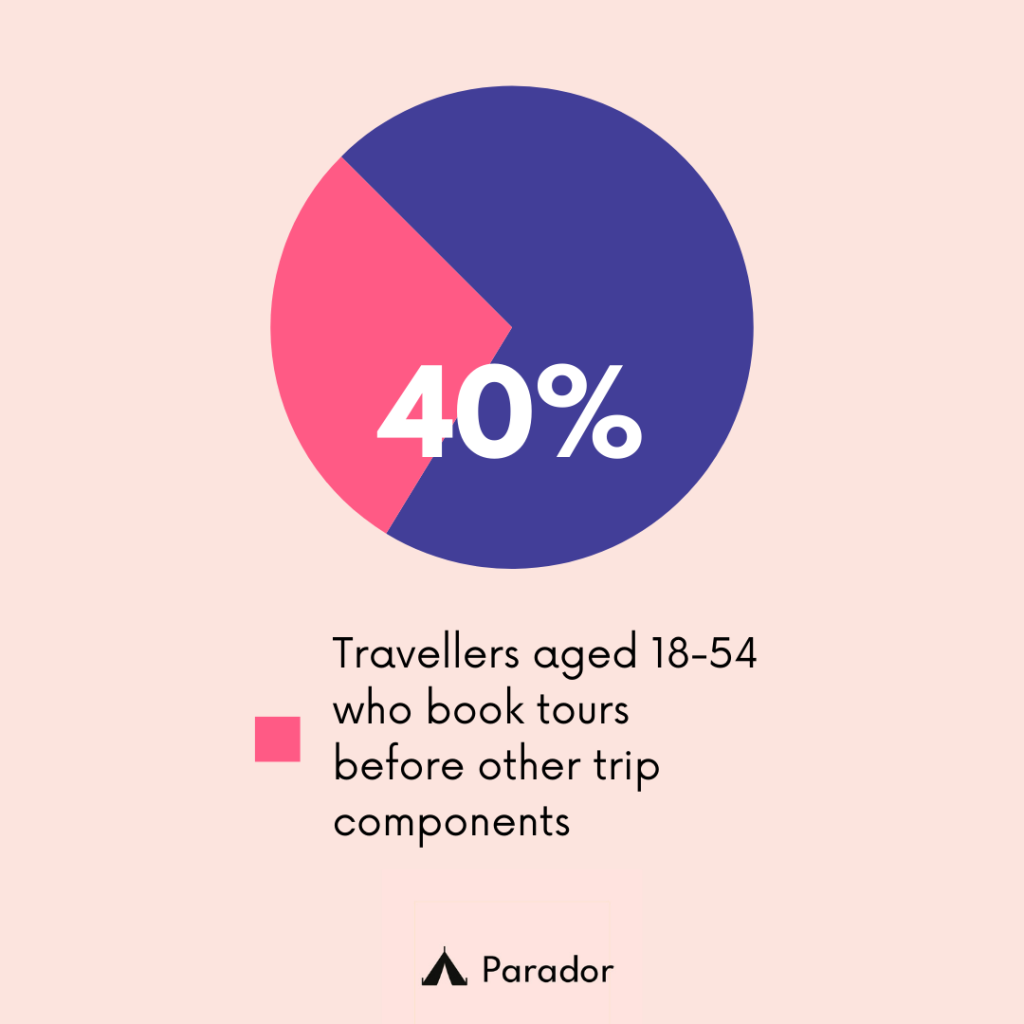
This is a large shift away from previous booking habits, where travellers would typically book tours and experiences as the last component of their trip, or while actually on their trip, finding out about tours and attractions via leaflets and in-destination contacts.
How do these new types of travellers find experiences, then? Usually, travel experiences are found via a search engine.
People tend to search for topics around their interests when planning a trip, by using specific keywords with the intention of finding out more about their destination, and what there is to experience there. From that information, they usually make an informed booking.
By writing SEO content around these topics, you increase the chances of gaining that booking.
User personas are the best way to know what those topics are.
Matching traveller personas with keywords
Use the following set of questions to come up with a detailed user persona to help guide your keyword research:
- What type of person is interested in your tours?
- How much money do they want to spend while travelling? Are they budget travellers, or are they going for a luxury holiday?
- What else might they be doing on their trip, apart from booking your tour or activity?
- What language do they speak? Where do they come from?
- How old are they?
Once you have an ideal user persona drafted up, you can begin to brainstorm seed keywords for that persona. Think of seed keywords as the ‘base’ keyword, from which other longer keywords can be extrapolated.
As an example, consider that your target audience is couples travelling together, aged between 20-35, with a moderate disposable income and an interests in arts, culture and cuisine.
It’s safe to assume that this persona might be interested in, among other things, museums, restaurants, boutique hotels and nightlife.
If I was a tour operator in Paris, for example, I could draft up a list of potential seed keywords from these interests, such as:
- guide to notre dame
- trendy restaurants in paris
- boutique hotels in paris
- paris festivals
- hidden gems in paris
- best paris markets
Or, I could ask ChatGPT with a detailed prompt such as the following:
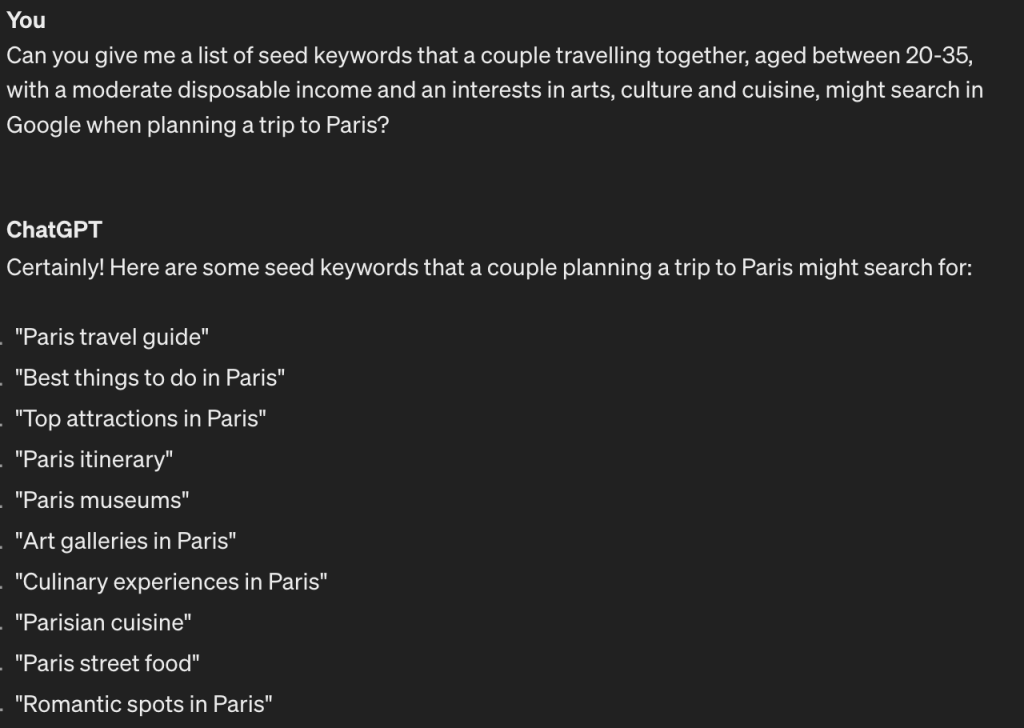
Remember, the phrases you come up with here are not necessarily what people type into search engines. Rather, they are phrases which will help to guide the next stage of the keyword research process, which is where you’ll find the actual keywords that people search.
How to get keyword data
In this section, we’ll use the seed keywords found in the last section to come up with a set of useable, data-backed keywords, then categorise them based on data such as search volume, competition and search intent.
From this information, we’ll be able to see which type of content best matches those keywords and where they sit in the travel marketing funnel, which will also help us to prioritise the order in which we tackle the keywords.
For this tutorial, we’re going to use Keysearch. While this is a paid tool, it is significantly cheaper than other keyword research tools on the market, but has all the functionality you will need to find and build a great keyword list for your tours. It also comes with a free trial.
Other tools we sometimes use include:
- Ahrefs is a great tool for carrying out keyword research in bulk, with useful views such as phrase match and related terms, which can be really helpful for travel keyword research, as well as good competitor keyword analysis features. While Ahrefs isn’t the cheapest keyword tool available, it is more affordable than others, such as SEMrush, for those who are starting out
- SEMrush is a full-suite keyword research tool that costs more than Ahrefs, but also gives more data on keywords. The amount of data SEMrush gives is probably beyond the scope of this guide, but they offer a 7-day free trial for you to try out all the features in their plan
- Keywords Everywhere – this keyword tool is great for getting keyword data directly within the SERPs. It can be installed as an extension in your browser and topped up on a ‘credit’ basis, so you can check keywords on the fly
- Google Keyword Planner – this free tool from Google can be useful to gauge general interest in topics and keywords, but the keyword volume and competition data it gives is very broad. However, it can be useful to start understanding the ins-and-outs of how keywords work on the web, and we have written a tutorial on travel keyword research using Google Keyword Planner.
Let’s start by opening Keysearch and typing one of our seed keywords from the previous section, ‘best things to do in Paris’, into the keyword search bar.

As you can see in the screenshot above, Keysearch returns some data about the keyword, including search volume, competition and CPC (cost-per-click for ad placements).
From this data, we can see that ‘best things to do in paris’ is a fairly competitive keyword, and the SERPs include results from huge sites like Time Out and Condé Nast Traveller.
With a difficulty score of 54, it may well be possible to rank on the third or fourth page with lots of dedicated resources. But, since SEO is essentially a winner-takes-all game (a study from 2024 shows that 68.7% of clicks go to the top 3 organic results) the chances of getting any clicks at all from the third page or lower is virtually zero.
Since it will be hard to beat these sites as an independent tour operator without building up huge SEO authority, this keyword should go on the back burner for now.
The power of long-tail keywords
However, looking at the related keywords section on the right, we can see some keywords that have far less competition: ‘best things to do in paris in march’, ‘best things to do in paris in april’, and ‘best things to do in paris at night’.
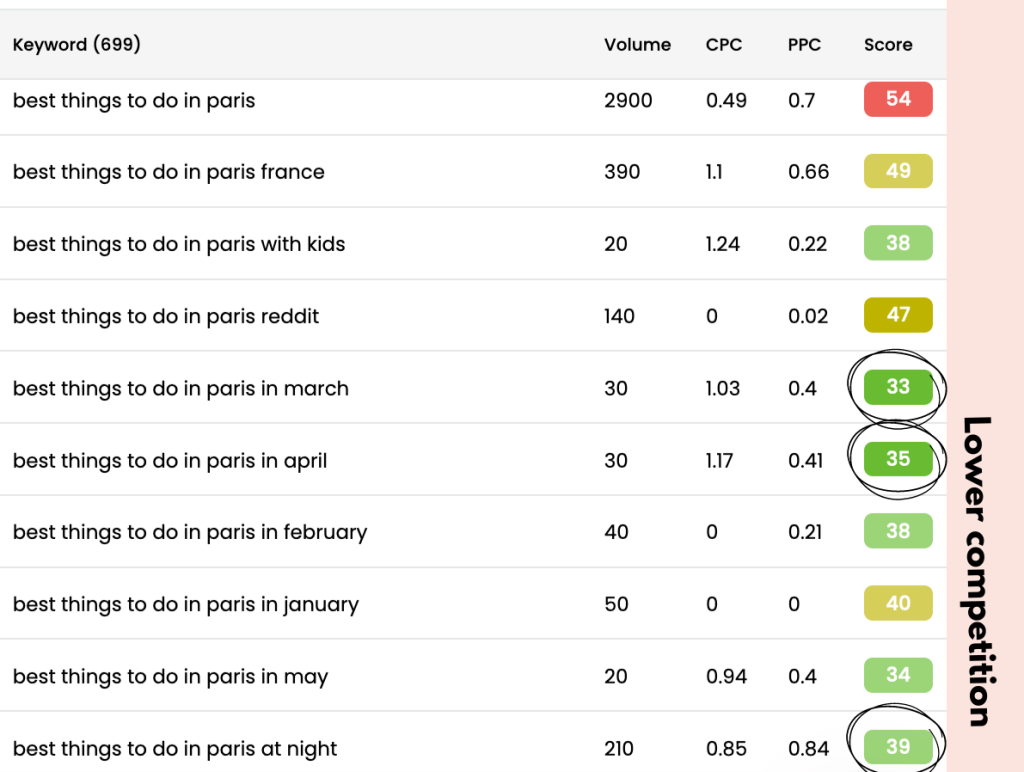
You can tell these keywords have less competition, because the top results are made up of independent travel sites, rather than titans like TripAdvisor and Time Out.
Additionally, at least one of these keywords, ‘best things to do in paris at night’, is heavily oriented towards our target audience of a young couple who are interested in nightlife, among other activities.
Phrases like this are called long-tail keywords, and they are your best bet for achieving visibility when planning your SEO keyword strategy.
Their logic comes down to a simple equation: would you rather miss out on 2900 searches for ‘best things to do in paris’ because your site is stuck on the third or fourth page behind all the competition, or be extremely visible for 270 searches a month from three keywords (210 + 30 + 30) that you have a reasonable chance of ranking for?
You can repeat this process for each of your seed keywords to come up with a shortlist of achievable keywords. The next step is to categorize them into local, commercial and informational keywords, which we’ll explain in the next section.
The 3 keyword types for tours and activities
There are three basic keyword types that are important for tour and activity operators. These are:
- Local keywords (usually typed on the day by ‘in-location’ travelers looking for specific attractions)
- Commercial keywords (for tour pages and people ready to book)
- Informational keywords (for higher-funnel blog content, these keywords are what the content side of your SEO strategy is based on)
If you’re a tour operator just starting out with SEO, we recommend to tackle keywords in the following order:
Local keywords > Commercial keywords > Informational keywords
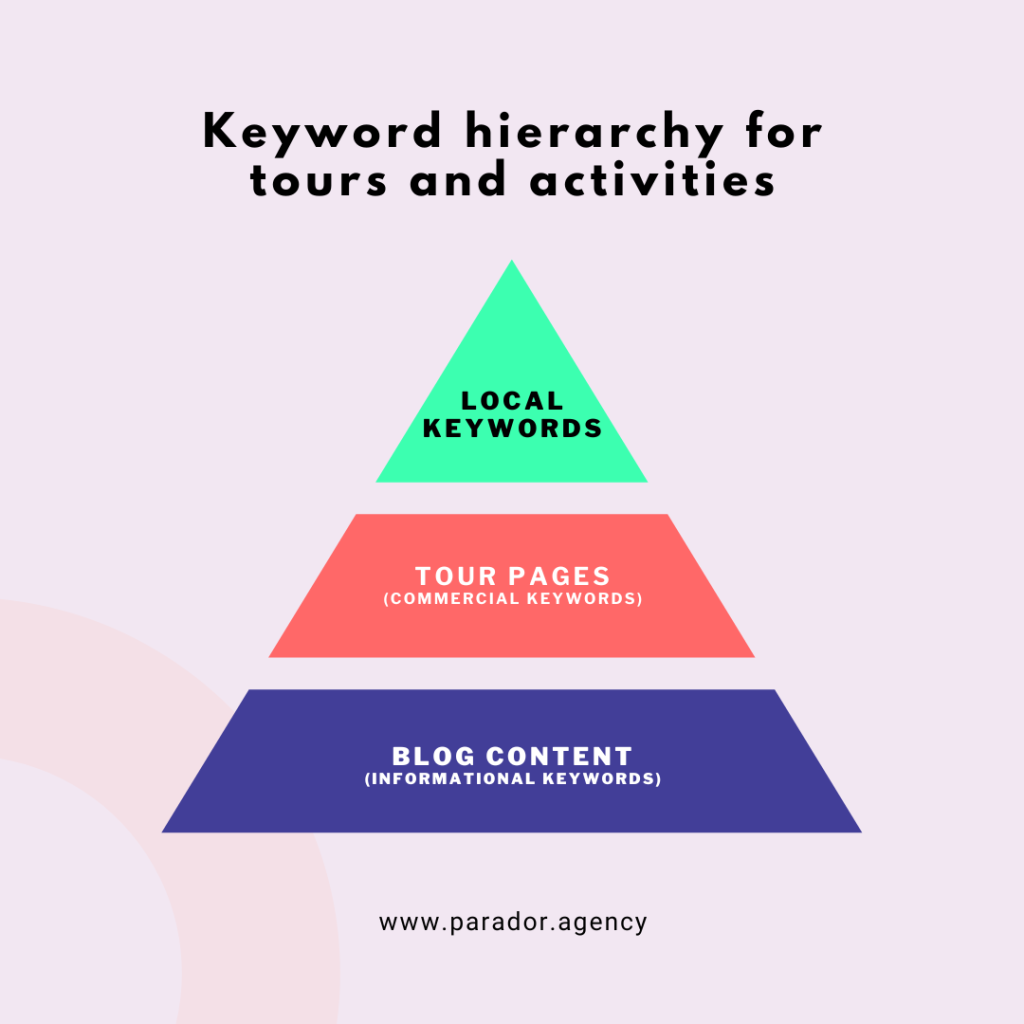
Aside from priority, this diagram also shows roughly how many of each keyword you should be tackling. There may only be one or two local keywords that are relevant to your business, and tour pages can usually be whittled down to 8 or 9 pages at maximum. The bulk of your keywords will be informational keywords, and these will support your money-making pages in ranking, driving traffic, and converting in customers.
And since each of these keywords also have their own subtypes, we find it most helpful to split up local, commercial and informational keywords into separate spreadsheets during keywords.
Let’s look at each of these three keyword types in detail:
1. Local keywords
Local keywords will usually have a word in them which indicates that searchers are looking for a specific company or location. This word might be ‘company’ or ‘operator’. They usually have a solid commercial intent, because the searcher is looking for information about a specific place, and it’s likely they want to make a booking.
Not all travel firms will have local keywords relevant to their business, though. For example, if you don’t operate a brick and mortar business, these types of keywords might not be relevant to you.
You can check whether a keyword is local by looking at the results: the map pack of local businesses shows up at the top of the page for for local keywords.
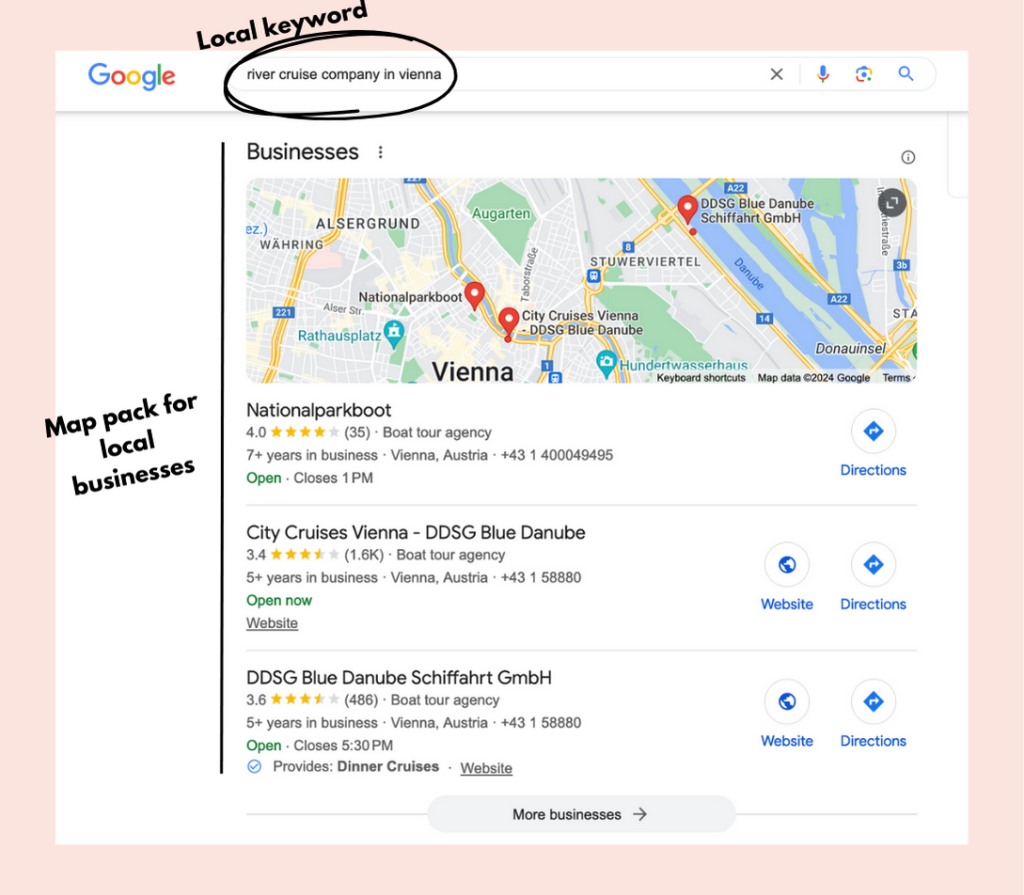
Some examples of local keywords for tour and activity operators include:
- Travel agents in [location]
- Tour operators in [location]
- River cruise company in [location]
- ‘specific attraction’ keywords, such as
2. Commercial keywords
Commercial keywords are those that searchers type when they’re ready to book a tour or activity. They have done their research, scrolled through pages of content, and planned their itinerary; all they have left to do is book.
They are different from local keywords, because they don’t usually refer to a specific brick-and-mortar business; rather, they are for experiences or activities.
A good way to illustrate the difference between local and commercial keywords is to look at the following two keywords:
‘culinary tour companies in charleston’ = local keyword (search intent is for specific business details, such as address or phone number, and will return the map pack of relevant businesses)
‘culinary tour charleston’ = commercial keyword (search intent is to find out information about a tour, not necessarily to speak with a business that organises tours, and will return web pages that give information about culinary tours)
You can tell which types of keyword are commercial by their wording. It usually looks like this:
Tour/activity + location = commercial keyword
For example, let’s look again at culinary tour charleston, which is made up of the activity (culinary tour), and its location modifier (charleston).
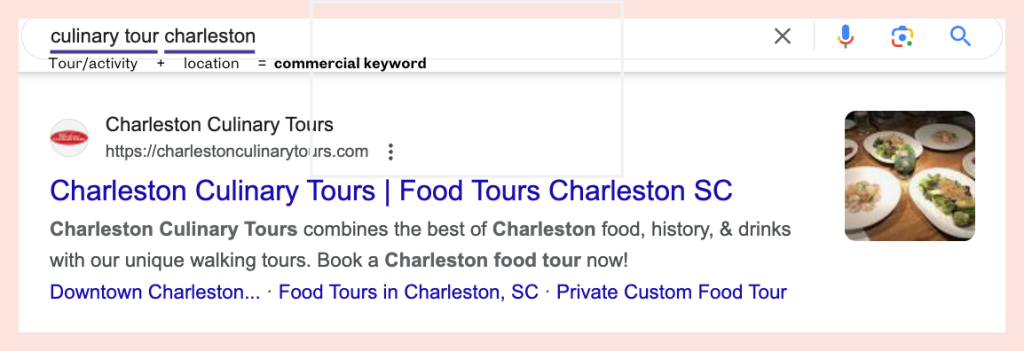
That’s not to say that the keyword will always be typed exactly in this way, however.
Possible alternatives could be ‘culinary tour in charleston‘, or ‘charleston culinary tour‘. Actually, one of the top results, shown in the screenshot above, has optimized their page and title tag for ‘charleston culinary tours’, rather than ‘culinary tour charleston’, which was the original keyword.
Does it matter? Not really.
Search engines are really good at identifying search intents, and they tend to show the same results for similar keywords that have the same search intent with different phrasing.
So, you might think that it’s important to research all of the possible variations on a particular keyword, and include all of the variations as many times as you can within your page. We disagree.
A helpful, relevant page that meets the search intent well should rank well across all keyword variations for that particular query, since the search engines understand the difference.
In fact, optimizing for tons of different variations within the page – or even worse, creating multiple pages to target different variations of the same keyword – is probably going to hinder your efforts to rank your tours in search engines. It’s a big no-no, and we strongly advise against it!
3. Informational keywords
The third type of keyword is informational keywords, and any smart tour operator will know that this is where the bulk of SEO effort will be concentrated.
Writing informational content on your website’s blog builds trust and authority. It positions you as an expert on your destination and drives bookers into your marketing funnel.
Writing content for informational keywords is a long-term investment, too; the more you write, the more SEO authority you build up around your destination, which helps all of your pages to rank higher.
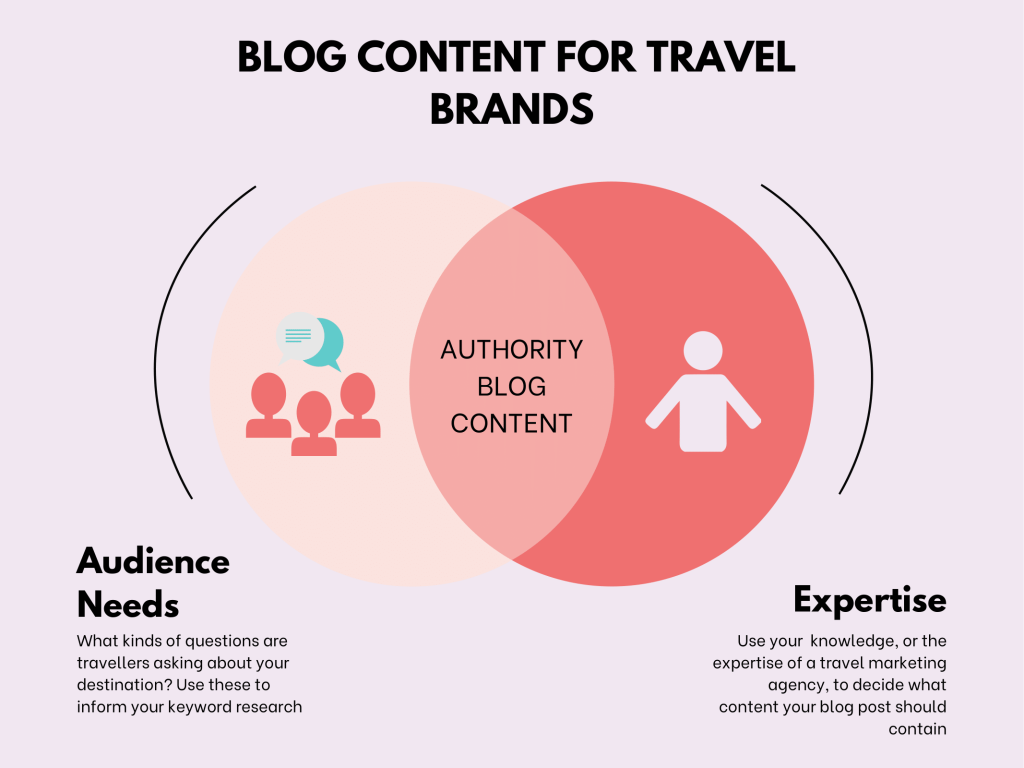
Think about the type of information that your audience might need (this is where the user personas we made earlier come in handy). Potential examples of informational content are guides to the culture, cuisine and history of the local area, tips on traveling to your destination, and information about when and why to visit.
This content might tackle keywords such as ‘best time to visit [destination]’, or ‘best Italian food in [destination]’, for example.
Travel keyword examples
To finish off this guide, here are a list of keyword modifiers that we check for every client, to make sure that no stone is left unturned. Put these into your preferred keyword research tool to check the volume and competition, and see whether they are relevant for you:
Destination modifiers
Whenever you see [destination] in the list of keywords below, replace it with each of the following destination modifiers inside your keyword research tool. You might just find a gem of a keyword:
- City
- Region
- Country
- Physical attraction (eg beach, trail)
Local attraction keywords
- Best beaches in [destination]
- Viewpoints in [destination]
- Landmarks in [destination]
- Gardens in [destination]
- Historic area in [destination]
Seasonal keywords
- Winter ski holidays in [destination]
- Summer beach holidays in [destination]
- Summer/spring/autumn/winter [this year/upcoming year] in [destination]
- Local holidays in [destination]
Budget keywords
- Affordable hotels in [destination]
- Backpacking in [destination]
- Visiting [destination] on a budget
- [destination] travel hacks
Cultural keywords
- Best restaurants in [destination]
- Local cuisine in [destination]
- Best museums in [destination]
- Festivals in [destination]
- Cultural tours in [destination]
- Art galleries in [destination]
- Museums in [destination]
Discount keywords
- Last minute deals [destination]
- Holiday discounts [destination]
- Package holidays [destination]
Local event keywords
- NYE in [destination]
- Music festivals in [destination]
- Events in [destination]
- Sporting events in [destination]
- Live music in [destination]
Conclusion: strategy starts with keyword research
We’ve seen how understanding your customer’s pain points and interests can inform your keyword research, and how those keywords can translate into bookings for your travel company.
We highly recommended spending a few hours or days coming up with the perfect list of tour keywords to target, and then begin to develop your pages, content and site structure around them.
If you need help with executing and implementing a full travel SEO strategy tailor-made to get more bookings for your business, then schedule a free 30-minute consultation with Parador to see how we can help you.

